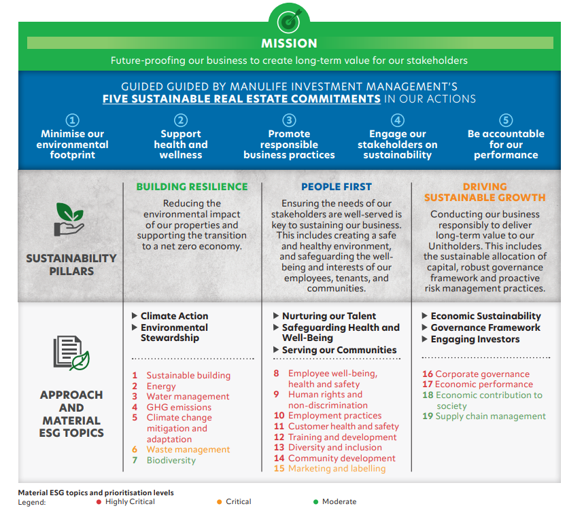Overview
Board Statement and Sustainability Framework

Board statement
At MUST, we recognise the integral role that Environmental, Social and Governance (ESG) factors play in driving long-term value and sustainability within the property investment landscape. As a responsible organisation, we are committed to integrating ESG considerations into our business and strategy to deliver long-term economic value for our stakeholders and contribute to the environmental and social well-being of our communities.
The Board of Directors (Board) provides oversight on the implementation, management and monitoring of MUST's sustainability matters, including material ESG topics. With support from the Sustainability Steering Committee (SSC), the Board and management regularly review material ESG topics and receive regular updates on the sustainability matters to ensure MUST achieves its sustainability targets and performance.

Exceeding Goals

Accolades

5 Star rating
since 2018

5.0 ESG Score;
Negligible risk


3.8
subsector average of 2.8
2024 Targets and Performance

Building Resilience
Reducing environmental impact of our properties and supporting the transition to a net zero economy

People First
Prioritising the health and well-being of our employees, tenants and the local community

Driving Sustainable Growth
Sustainable allocation of capital, robust governance framework and proactive risk management practices
MUST ESG Journey
Sustainability Report

Glossary

BOMA 360
The BOMA 360 Performance Program sets the standard worldwide for operational best practices in the commercial real estate industry. Earning the prestigious BOMA 360 label demonstrates that a building is outperforming the competition across all areas of operations and management.
CDP (formerly known as Carbon Disclosure Project)
CDP is a non-profit charity that runs a global environmental disclosure system that helps companies and cities manage their environmental impacts.
CDSB (Climate Disclosure Standards Board
CDSB, managed by an international consortium of business and environmental non-governmental organisations is a framework for reporting environmental information with the same rigour as financial information
DJSI (Dow Jones Sustainability Indices)
Created jointly by S&P Dow Jones Indices and the Sustainable Asset Management Group, DJSI is the first global sustainability benchmark that assesses leading companies based on ESG criteria. The indices also serve as creditable reference points in sustainability investing for investors globally.
ENERGY STAR
Run by the U.S. Environmental Protection Agency and U.S. Department of Energy that promotes energy efficiency, ENERGY STAR is awarded to the top 25% commercial buildings for meeting strict energy performance standards.
FTSE4Good (Financial Times Stock Exchange for Good)
FTSE4Good Index Series identifies companies demonstrating strong ESG policies and practices. To be included in this index, companies are independently assessed on more than 300 indicators, which are applied according to each company’s unique ESG risk exposure.
Fitwel Certification
Fitwel is a world-leading certification system that is devoted to wellness within the design, development and operations of buildings and communities. It evaluates buildings based on design and operations across seven health impact categories, encompassing features such as indoor air quality, access to green spaces and alternative transportation, among others
Green Champion
Sustainability leaders are appointed at each of MUST’s buildings to lead the sustainability effort from the ground. Based on guidelines from the Sustainability Building Standards, Green Champions engage the tenants and strive to achieve their sustainability goals.
GRI (Global Reporting Initiative)
GRI Standards is the most widely adopted sustainability reporting standards developed with the intention of those standards being applied on a globally consistent basis, thus providing stakeholders with the ability to compare the impacts of organisations. The Standards are regularly reviewed to ensure they reflect the global best practice for sustainability reporting,helping organisations respond to emerging information demands from stakeholders and regulators.
GHG (Greenhouse Gas) emissions
GHG are gases that trap heat in the atmosphere, contributing to global warming. The six main greenhouse gases in the atmosphere include Carbon Dioxide (CO2), Methane (CH4), Nitrous Oxide (N2O), Hydrofluorocarbons (HFCs), Perfluorocarbons (PFCs) and Sulphur hexafluoride (SF6).
GIFT (Governance Index For Trusts)
GIFT is an assessment of the governance and business risks for real estate investment trusts and business trusts listed in Singapore. It was launched in 2017 by Associate Professor MakYuen Teen (NUS Business School) and Chew Yi Hong (active investor and keen observer of the corporate governance scene) in collaboration with governanceforstakeholders.com, with thesupport of the Singapore Exchange (SGX).
Green energy purchase
The purchase and use of renewable electricity directly from the power supplier. Renewable electricity sources may include solar, water, wind and geothermal energy resources.
Green loan
Green loans are any type of loan instrument whose proceeds can only be used for green projects (including other related and supporting expenditures such as R&D). All designated green projects should provide clear environmental benefits, which will be assessed, quantified, measured and reported by the borrower.
GRESB (Global Real Estate Sustainability Benchmark)
GRESB assesses and benchmarks the ESG performance of real estate and infrastructure assets worldwide, aligned with international reporting frameworks, such as the GRI, DJSI, among others. Companies are evaluated on indicators including leadership management and stakeholder engagement, asset portfolio performance, as well as efforts in addressing ESG issues in the design, construction and operation of buildings.
iEdge SG ESG Leaders Index
The iEdge SG ESG Indices comprise liquid SGX-listed stocks, and are screened in accordance with transparent ESG criteria. The indices are designed to identify SGX-listed companies that meet minimum sustainability reporting requirements and are considered ESG leaders with established and leading ESG practices. The SGX ESG Leaders Index is an ESG-factor index that measures the performance of stocks in the Leaders index with a weighting tilted towards the company’s ESG rating as provided by Sustainalytics.
ISSB (International Sustainability Standards Board)
ISSB is responsible for developing International Financial Reporting Standards (IFRS) Sustainability Disclosure Standards, to provide a truly global baseline of sustainability disclosures to further inform economic and investment decisions.
LEED (Leadership in Energy and Environmental Design)
LEED is one of the most widely used green building rating systems in the world. Available for virtually all building types, LEED provides a framework for healthy, highly efficient, and cost-saving green buildings.
MSCI ESG
An MSCI ESG rating is designed to measure a company’s resilience to long term industry material ESG risks and how well they manage those risks relative to their peers.
Net Zero
Net Zero refers to the net amount of carbon emissions produced by any one entity, and is achieved when the amount emitted is offset by an equal amount absorbed from the atmosphere. Emissions emitted are largely from human activities such as the burning of fossil fuels for energy (e.g., electricity, heating and transportation activities). Emissions absorbed refers to the removal of carbon emissions from the atmosphere through reforestation, carbon capture and storage solutions, as well as the use of renewable energy which does not emit any emissions.
PRI (Principles for Responsible Investment)
PRI is a United Nations-supported international network of investors working together to implement its six aspirational principles, often referenced as "the Principles". The six Principles for Responsible Investment offer a menu of possible actions for incorporating ESG issues into investment practice to guide signatories in incorporating ESG into their investment strategies and policies. There are currently about 7,000 corporate signatories in 135 countries and it is the world's largest voluntary corporate sustainability initiative.
SASB (Sustainability Accounting Standards Board)
SASB is an ESG reporting standard that guides the disclosure of financially material sustainability information by companies to their investors. Available for 77 industries, the SASB Standards identify the subset of ESG issues most relevant to financial performance in each industry. SASB Standards are industry-specific because the issues that are mostly likely to impact financial performance vary by industry. SASB Standards are maintained under the auspices of the Value Reporting Foundation.
Scope 1 and Scope 2 emissions
Scope 1 emissions are direct GHG emissions that occur from sources that are controlled or owned by an organisation (e.g., emissions associated with fuel combustion in boilers,furnaces, vehicles).
Scope 2 emissions are indirect GHG emissions associated with the purchase of electricity, steam, heat, or cooling.
SGTI (Singapore Governance and Transparency Index)
A collaboration between CPA Australia, NUS Business School’s Centre for Governance and Sustainability, and Singapore Institute of Directors, the SGTI is the leading index forassessing corporate governance disclosure and practices, as well as the timeliness, accessibility and transparency of financial results announcements of Singapore-listed companies.Companies are scored based on board responsibilities, rights of shareholders, engagement of stakeholders, accountability and audit, and disclosure and transparency. The aggregateof the bonuses and penalties is incorporated to arrive at the company’s overall SGTI score.
SGX Fast Track programme
The SGX Fast Track programme aims to affirm listed issuers that have been publicly recognised for high corporate governance standards and have maintained a good compliance track record. SGX Fast Track issuers can expect prioritised clearance for their corporate action submissions to SGX RegCo. An issuer’s eligibility for the programme will be continuously monitored and SGX RegCo has the discretion to exclude an issuer from the scheme at any time.
Sustainable Building Standards (SBS)
Manulife Investment Management’s Sustainable Building Standards act as our guide to advancing sustainability within all buildings. These standards define requirements and best practices to property teams and encourage improvement for the benefit of stakeholders, in areas such as environmental risks, energy and water consumption, waste diversion, GHG emissions, climate risks, nature and biodiversity, and social impact.
Sustainability-linked loan
Sustainability-linked loans are loans which incentivise the borrower’s achievement of ambitious, predetermined sustainability performance objectives. Borrowers of sustainability-linked loans commit to certain sustainability performance targets and are awarded a reduction in the loan interest rate if these targets are met.
Sustainalytics
Sustainalytics, a Morningstar Company, provides high-quality, analytical ESG research, ratings and data to institutional investors and companies by measuring the size of an organisation’s unmanaged ESG risk. This is measured by a unique set of material ESG issues, so it only considers issues which have a potentially substantial impact on the company’s economic value. The rating scores the ESG performance of more than 12,000 companies, from negligible to severe risk.
TCFD (Task Force on Climate-Related Financial Disclosures)
TCFD was created in 2015 by the Basel-based Financial Stability Board to promote international financial stability after the 2008 global financial crisis. The TCFD’s focus is on reporting on the impact an organisation has on the global climate by incorporating climate-related risks and opportunities into their risk management, strategic planning and decision-making processes. The TCFD reporting framework based on a set of disclosure recommendations span four different areas: governance, strategy, risk management, and metrics and targets.
UN SDGs (UN Sustainable Development Goals)
A set of sustainable development goals (SDGs) established by the United Nations in 2015, which 193 member countries have endorsed as part of the 2030 Agenda for SustainableDevelopment. These goals form the blueprint of the agenda to tackle the world's most pressing problems, such as poverty, inequality, climate change and access to education. There are 17 broad goals, each of which has multiple targets that must be met for the goal to be attained. In all, there are 169 targets.
VRF (Value Reporting Foundation)
VRF is a global non-profit organisation that offers a comprehensive suite of resources designed to help businesses and investors develop a shared understanding of enterprise value. The resources include Integrated Thinking Principles, the Integrated Reporting Framework, and SASB Standards.











